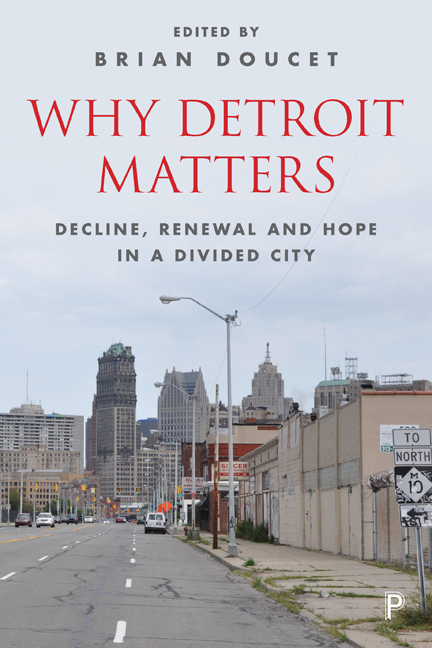Book contents
- Frontmatter
- Contents
- List of contributors
- List of figures and tables
- Acknowledgments
- one Introduction: why Detroit matters
- Section One Lessons from Detroit
- Intermezzo I You may not know my Detroit
- Section Two Practices from Detroit
- Intermezzo II My Detroit
- Section Three Conversations from Detroit
- References
- Index
twelve - Reconstructing Detroit: the resilient city
Published online by Cambridge University Press: 05 April 2022
- Frontmatter
- Contents
- List of contributors
- List of figures and tables
- Acknowledgments
- one Introduction: why Detroit matters
- Section One Lessons from Detroit
- Intermezzo I You may not know my Detroit
- Section Two Practices from Detroit
- Intermezzo II My Detroit
- Section Three Conversations from Detroit
- References
- Index
Summary
In this chapter, Khalil Ligon discusses the role in which non-municipally led community development strategies can play a role in revitalizing Detroit. She argues that Detroiters who have persisted and remained in the city despite all its problems should play a central role in shaping its future. Rather than focusing on “resilient” cities, Ligon sees resilience coming from Detroiters themselves. In the absence of any strong and visionary leadership, they have taken matters into their own hands. Such sentiments featured strongly in Kimberley Kinder's chapter (Chapter Six) on do-it-yourself urbanism and will be a central focus of many of the conversations in Section Three. What sets Ligon's chapter apart is her ability to easily move between the two worlds of planning and the grass-roots community initiatives she describes in this chapter.
Ligon's approach to urban planning, design, and development has been framed by the experience of witnessing her own neighborhood's dramatic decline. She grew up (and still resides in) the area near the Coleman A. Young International Airport in Northeast Detroit (see Chapter One). The first time we met, she described how the closure of McNichols Road by the airport severed her community in two, separating people from businesses, schools, and churches. She then saw first-hand the effects that such a planning decision had on her community. Today, she is one of the few residents still living on her street. As a result of seeing this transformation, her professional life has been dedicated to championing community planning efforts such as the ones she describes in this chapter, some of which she has been personally and professionally involved with. They offer opportunities for shared and inclusive visions and stand in contrast to the developer- and corporate-led projects in Downtown. Her central message is that city officials need to listen to, and empower these community initiatives if Detroit is to avoid repeating past mistakes and injustices.
Khalil Ligon is chief executive officer of Vista Vantage Consulting Group, L3C, an urban planning and environmental design firm based in Detroit. She has developed award-winning community plans and leads a variety of sustainability initiatives to advance green infrastructure, climate adaptation, and food systems development. Khalil is active throughout the community, serving on various boards, including the Detroit Eastside Community Collaborative (DECC), the US Green Building Council, and the Detroit Greenways Coalition. She holds a master's degree in urban planning from Wayne State University.
- Type
- Chapter
- Information
- Why Detroit MattersDecline, Renewal and Hope in a Divided City, pp. 221 - 232Publisher: Bristol University PressPrint publication year: 2017



